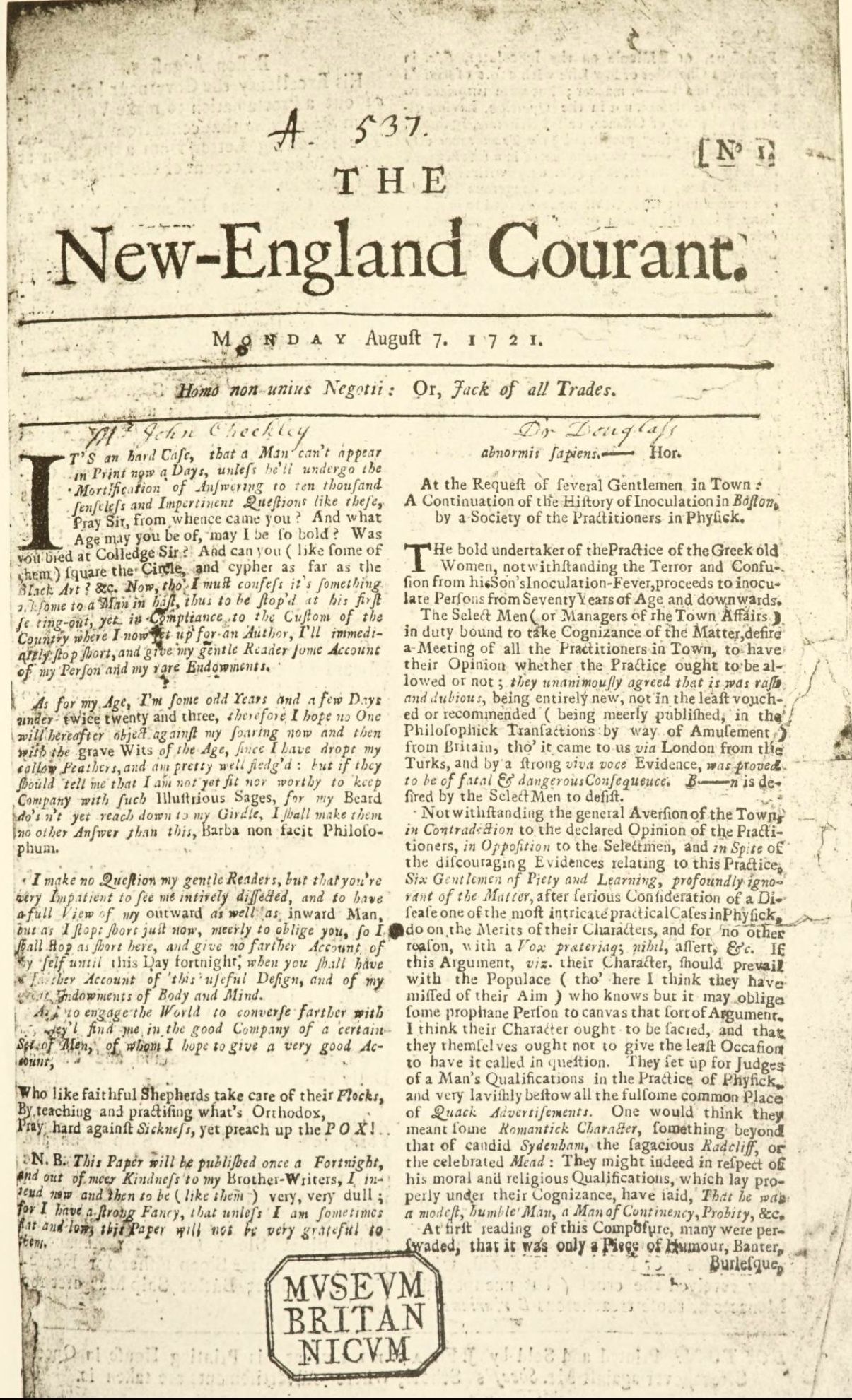Although most Americans know about Benjamin Franklin and his impact on freedom of speech and press, his older brother James Franklin (1697-1735), to whom he was for a time apprenticed in Boston, was also important in highlighting American views on the subject and preparing the way for modern First Amendment freedoms.
Activities in Boston
After learning the printing trade in England, James Franklin returned to Boston in 1717 with a printing press. After printing the Boston Gazette, he began publishing the New England Courant newspaper in 1721, which he continued until 1726. The paper, which “featured local controversies, belletristic material, and news of New England events,” has been described as “the first literary, lively, entertaining, humorous, and proto-nationalistic American newspaper” (Lemay 2995, 109). The paper, which printed Benjamin Franklin’s famed Silence Dogood essays (James did not initially realize that his brother had authored them), was patterned after The Spectator and other English papers. It generated considerable controversy by including articles that questioned smallpox vaccinations and the clergymen in Boston who were defending them.
The members of the clergy responded, in turn, by labeling the Courant’s writers as a “Hell-fire Club,” after members of a sacrilegious group in London that was said to worship the devil (Smith 1981, 6). A journalism professor notes that Franklin, who reveled in the publicity that the controversy was generating, still attempted to focus on arguments rather than on personality. The professor observed that Franklin’s responses indicated “that a printer should remain impartial, that writers should avoid private as opposed to public matters, and that individuals had a fundamental right to self-defense” (Smith 1981, 7). Franklin noted that calling his writers the Hell-fire Club was more libelous than anything they had printed.
Franklin was the first American to print Henry Care’s English Liberties, Or the Free-Born Subject’s Inheritance. He also printed some of John Trenchard and Thomas Gordon’s Cato’s Letters, including their defense of freedom of the press.
In 1722, the General Court of Massachusetts jailed Franklin through its legislative privilege and subjected him to prior censorship, a move that the House rejected. Benjamin was listed as the editor, as James was in jail. After James Franklin’s release, he continued to publish articles criticizing church and governmental leaders. He was again arrested and once again protested that his arrest violated the rights of Englishmen and the requirements of due process. In time, the fortunes of the paper declined, and Franklin moved to Rhode Island, which was known as a more tolerant colony and, since the time of Roger Williams, had long harbored dissenters.
Activities in Rhode Island
In Rhode Island, Franklin praised the freedom that it provided to religious dissenters, published somewhat ribald almanacs under the pseudonym of “Poor Robin,” and edited the short-lived Rhode Island Gazette. Franklin’s widow continued his business after he died and was later joined by James Franklin Jr., who founded the long-running Newport Mercury.
Role in preparing the ground for American Revolution
Benjamin Franklin regarded his older brother as something of a tyrant and left his apprenticeship to go to Philadelphia, but he undoubtedly learned from him. The activities of James and Ben Franklin, and other early American editors, paved the way for later newspapers, whose intense criticisms of British taxes led to the Revolutionary War.
Thomas Hutchinson, who served as the royal governor of Massachusetts from 1771 to 1774, observed that “The minds of the people were prepared for impressions from pamphlets, courants, and other newspapers, which were frequently published, in order to convince them, that their civil liberties and privileges were struck at.” (Lemay 2005, 142). Their activities indicate that while editors could still be subject to prosecutions for seditious libel, they had as much, if not more, freedom to publish in North America as they had in Great Britain.
John R. Vile is a political science professor and dean of the Honors College at Middle Tennessee State University.

